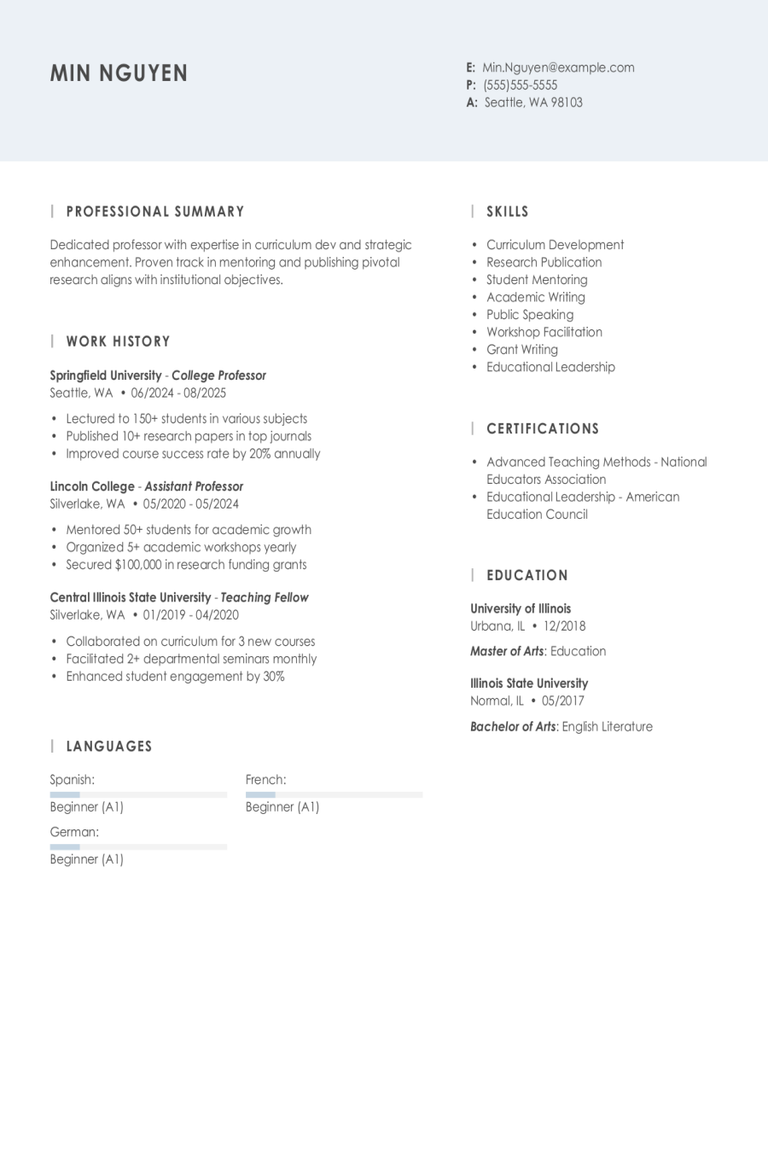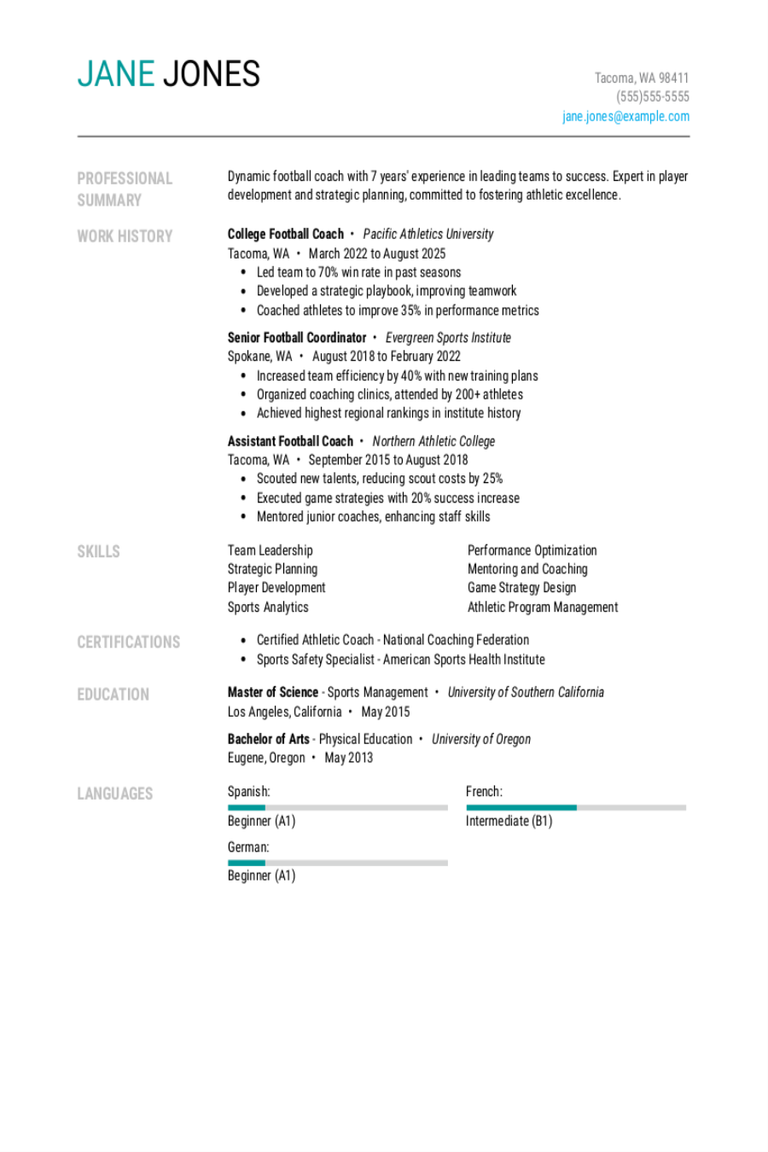Table of Contents
Get started with MyPerfectResume today!
- Build a resume on any device
- Pick an ATS-friendly template
- Tailor with AI copy suggestions
Why this resume works
- Quantifies accomplishments: Boosting learning outcomes by 20% and securing $250K in funding, reveals the applicant’s compelling accomplishments.
- Highlights industry-specific skills: Industry-specific skills such as curriculum development and instructional design clearly align with roles across educational settings, making a strong case for the applicant’s industry expertise.
- Uses action-oriented language: Using action verbs like “developed” and “led,” showcases a proactive approach to educational leadership.
More College Resume Examples
These college resume examples can help you showcase your skills and experience, from internships to campus involvement. Use these samples to create a standout resume that highlights what makes you a strong job seeker for any job.
Campus tour guide
Why this resume works
- Sections are well-organized: Effective use of bullet points and headers makes the resume easy to scan, ensuring key achievements are quickly accessible and improving readability.
- Places contact information prominently: A professional resume header is essential for callbacks, providing quick access to contact information and establishing credibility right from the start.
- Puts skills at the forefront: By using a skills-based resume format to prioritize relevant skills like leadership and customer service, the applicant show their strengths upfront.
Student activities coordinator
Why this resume works
- Points to measurable outcomes: By showcasing achievements like increasing student participation by 40%, the applicant illustrates their effectiveness in driving engagement and optimizing event strategies.
- Demonstrates language abilities: The applicant’s diverse language skills facilitate effective cross-cultural communication and support international collaboration.
- Displays technical expertise: The applicant’s certifications in student affairs and event planning highlight their specialized expertise necessary to excel in coordinating complex campus activities.
Resident advisor
Why this resume works
- Focuses on work history: Using a chronological resume format, the applicant’s extensive career journey is clearly mapped out from recent to past roles.
- Lists relevant certifications: Listing certifications such as Certified Resident Life Professional and Community Leadership Certification highlights their dedication to mastering community management skills.
- Emphasizes leadership skills: By showing how they led teams, handled budgets, and pioneered successful programs, the applicant’s leadership skills shine through.
College Resume Template (Text Version)
Emily Jones
Oakridge, OR 97465
(555)555-5555
Emily.Jones@example.com
Professional Summary
Seasoned education professional with expertise in curriculum design, research, and program management. Proven track record of boosting learning outcomes by 20%+ and securing $250K in research funding. Adept at leveraging technology and partnerships to enhance educational experiences.
Work History
College
Education Horizon University – Oakridge, OR
August 2023 – August 2025
- Developed curriculum for student engagement (+20%).
- Conducted research efforts yielding $250K funding.
- Organized campus-wide events for 1,000+ attendees.
Education Program Manager
KnowledgeWorks Global Institute – Oakridge, OR
August 2020 – July 2023
- Led training events for 500+ educators annually.
- Improved program efficiency (+35%) via new tools.
- Secured partnerships with 10 institutions statewide.
Instructional Designer
Learning Innovations Lab – Portland, OR
August 2018 – July 2020
- Designed online courses increasing completion (+18%).
- Enhanced course content quality for better SEO ranking.
- Developed training guides adopted by 100+ schools.
Skills
- Curriculum Development
- Instructional Design
- Project Management
- Learning Technologies
- Data Analysis
- Team Leadership
- Research Methodologies
- Event Coordination
Education
Master’s Education Leadership
University of Texas Austin, Texas
May 2018
Bachelor’s Educational Technology
Texas A&M University College Station, Texas
May 2016
Certifications
- Certified Learning and Development Specialist – National Association of Educational Trainers
- Teaching with Technology Certification – EdTech Institute
- Advanced Curriculum Design Certification – Global Education Network
Languages
- Spanish – Beginner (A1)
- French – Intermediate (B1)
- Chinese – Beginner (A1)
Related Resume Guides
Advice for Writing Your College Resume
Ready to kickstart your journey toward landing a college job?
Whether you’re aiming for a teaching assistant role or looking to dive into research, learn how to write a resume that effectively presents your academic achievements and passion for education.
Highlight relevant certifications and training
Including certifications and specialized training on your resume is key for college professionals to demonstrate a commitment to learning. These credentials can make you stand out when applying for jobs.
By placing a “Certifications & Training” section after the education section or skills section, you effectively highlight these achievements. In this section, include certifications, courses, or training that show you have been trained in the skills required for the job.
Listing relevant certifications in your resume can greatly improve your chances of success in a college setting. They show that you are ready to handle diverse challenges. Including relevant certifications helps present you as a well-prepared professional eager to contribute to the academic community.
Example of a certifications & training section
Google IT Support Professional Certificate
Issued by: Google/Coursera
Fundamentals of Engineering (FE) Certification
Issued by: National Council of Examiners for Engineering and Surveying (NCEES)
Adobe Certified Professional in Graphic Design & Illustration Using Adobe Illustrator
Issued by: Adobe
Project Management Essentials Certification
Issued by: Management and Strategy Institute
To get ideas for your resume, check out these professional resume examples to see how others highlight their skills and experience.
List your most relevant skills
When you’re applying for a college role, it’s important to highlight both technical and soft skills. Technical skills might include software knowledge or artistic abilities that are relevant to the position.
For example, if the role involves graphic design, knowing Adobe Photoshop or Illustrator could be key. Meanwhile, soft skills like communication, teamwork, and problem-solving are equally important because they show you can work well with others and handle challenges effectively.
Including a dedicated skills section on your resume is a great way to showcase what you can do. You should list any specific software or artistic talents you have. But don’t just stop there—make sure to weave these skills into your work experience bullet points to show how you’ve applied them in real situations, making your application stronger and more relatable.
By balancing technical know-how with soft skills and integrating them into your past experiences, you’ll present yourself as a well-rounded job seeker ready for the challenges of a college role. This approach makes it clear that you not only have the necessary tools but also know how to use them effectively in various situations.
For college students, choosing a resume format that highlights education, skills, and activities can effectively showcase your potential to employers.
Write a strong professional summary
A professional summary on a resume serves as an introduction to hiring managers, providing a snapshot of your qualifications and what makes you stand out. When crafting a resume, it’s important to decide whether to include a summary or an objective statement.
A professional summary is ideal for experienced applicants. It consists of three to four sentences showcasing your experience, skills, and achievements. Its purpose is to reveal your professional identity and the value you bring to the role. This approach focuses on “what I’ve accomplished,” making it perfect for those with a strong track record.
Resume objectives are career goal statements best suited for entry-level applicants, career changers, or those with employment gaps. Unlike summaries, objectives emphasize “what I aim to contribute.” They give insight into future aspirations rather than past achievements.
Now that we’ve explored both options, let’s look at examples of summaries and objectives tailored for various industries and experience levels. These will help guide you in creating effective content for your resume.
College resume summary examples
Entry-level
Recent Bachelor of Science in Computer Science graduate with a strong foundation in programming, data structures, and algorithms. Completed internships at tech startups focusing on software development and quality assurance. Skilled in Java, Python, and SQL with a keen interest in developing innovative solutions for real-world problems.
Mid-career
Results-driven marketing specialist with over seven years of experience in digital marketing and brand management. Proven track record of increasing online engagement through strategic social media campaigns and content creation. Experienced in using SEO tools and analytics platforms to drive traffic growth and improve brand visibility.
Experienced
Seasoned project manager with more than 15 years leading cross-functional teams in the construction industry. Expert in project planning, risk management, and cost control with a history of delivering projects on time and within budget. Strong leadership skills demonstrated by managing large-scale commercial projects exceeding $100 million.
College resume objective examples
Recent graduate
Driven recent graduate with a Bachelor of Science in Computer Science seeking an entry-level software developer role to apply coding and problem-solving skills in creating innovative applications. Committed to contributing to team projects and advancing technical expertise in the field of software engineering.
Career changer
Dedicated professional transitioning into data analysis, leveraging analytical abilities and experience with statistical tools gained through coursework and hands-on projects. Eager to join a collaborative environment where insights can drive strategic decisions and business growth.
Specialized training
Ambitious college graduate with certifications in digital marketing strategies seeking a position as a marketing coordinator. Passionate about using knowledge of SEO, social media campaigns, and market research to improve brand visibility and connect with target audiences effectively.
Use our Resume Builder to make your college student resume stand out with easy-to-use templates that help you highlight your skills, experiences, and education effectively.
Showcase your accomplishments and publications
Listing your publications, conference presentations, and research accomplishments can make your resume stand out when applying for a college position.
This section highlights your knowledge and contributions to your field, helping hiring committees see the depth of your work and how active you are in academic circles. By including peer-reviewed articles, book chapters, and conference papers, you’re showcasing the quality and scope of your scholarship.
When adding these details, use a structured format that includes citation information like journal name, volume, issue, and year. Following a professional style guide such as APA or MLA makes it easier for others to find and verify your work.
Don’t forget to mention major awards, grants, or fellowships you’ve received—these demonstrate that others recognize the significance of your research. Additionally, linking online profiles like Google Scholar or ResearchGate allows people to access more of your work easily.
By including these elements thoughtfully, you provide a complete picture of your achievements while strengthening your application for roles within college settings.
Example of publications section
Conference Presentations
- Chen, L. (2024). Using Digital Storytelling to Improve Oral Proficiency in Chinese University Students [Poster presentation]. International Conference on English Language Teaching and Learning (ICELT), Singapore.
- Chen, L. (2023). The Effects of Task-Based Language Teaching on the Pragmatic Competence of Chinese ESL Learners [Presentation of research paper]. Teachers of English to Speakers of Other Languages (TESOL), Portland, OR.
When selecting a resume template, opt for one with clear sections. Ensure it remains neat and simple, avoiding fancy fonts or excessive colors, so your skills and experience are highlighted effectively.
FAQ
Do I need to include a cover letter with my college resume?
Yes, including a cover letter with your college resume can demonstrate your motivation and make your application more memorable.
A cover letter lets you explain why you’re interested in the program or opportunity, highlight relevant skills or experiences, and show how you’d be a great fit.
For instance, if the college offers unique courses, research opportunities, or extracurriculars that align with your goals, you can mention those details to personalize your application.
To simplify the process, try using our Cover Letter Generator to quickly create tailored content or refine what you’ve written for maximum impact.
Additionally, reviewing cover letter examples specifically designed for academic roles can help inspire ideas and ensure your format is professional yet engaging.
How long should a college resume be?
For a college student, a one-page resume is typically sufficient. This format allows you to concisely highlight your education, relevant coursework, internships, and any leadership roles or extracurricular activities. Since you’re early in your career, focus on showcasing skills and experiences that align with your future goals.
If you’ve accumulated extensive experience through various internships or projects, consider using a two-page resume. Ensure all details are directly related to the position you’re aiming for and maintain clarity throughout.
Explore our guide on how long a resume should be to find examples and tips specific to your stage of career development.
How do you write a college resume with no experience?
To create a resume with no experience, focus on showing the credentials and skills you do have that make you qualified for the job you’re after.
- Highlight education: Start by listing your college, major, anticipated graduation date, and any academic awards or honors. This establishes your educational foundation.
- Include relevant coursework: Mention courses related to the field you’re interested in. This shows you have foundational knowledge even if you haven’t worked in the field yet.
- Showcase extracurricular involvement: Detail clubs, sports teams, or volunteer work where you held leadership roles or contributed significantly. These experiences can demonstrate skills like teamwork and initiative.
- Emphasize transferable skills: Identify skills gained from part-time jobs or personal projects such as communication, problem-solving, or computer skill. These are valuable in any role.
Explore our guide on crafting a resume with no experience for more detailed advice tailored to college students entering the job market.
Rate this article
College
Share this page
Additional Resources

Gen Z Job Market Trends: Data Reveals College Graduate Unemployment Rate Is on the Rise

College Professor Resume Examples & Templates
Learn how college professors can highlight their teaching expertise and academic accomplishments. These resume tips and examples showcase how to emphasize your research, classroom experience, and ability to engage and

College Football Coach Resume Examples & Templates
Discover college football coach resume examples and learn how to show hiring teams you’re passionate, experienced, and ready to lead athletes to victory.Build my resumeImport existing resumeCustomize this templateWhy this

College Counselor Resume Examples & Templates
Browse college counselor resume examples and tips to learn how to highlight your communication skills, advising experience, and knowledge of academic programsBuild my resumeImport existing resumeCustomize this templateWhy this resume

How to Write a College Application Resume (Examples & Tips)

Linking College Education to Career Success: A Personal Insight
Hiring managers ask a number of interview questions- and there are some that are quite commonly asked. One that actually gets asked frequently is “how has your education prepared you
